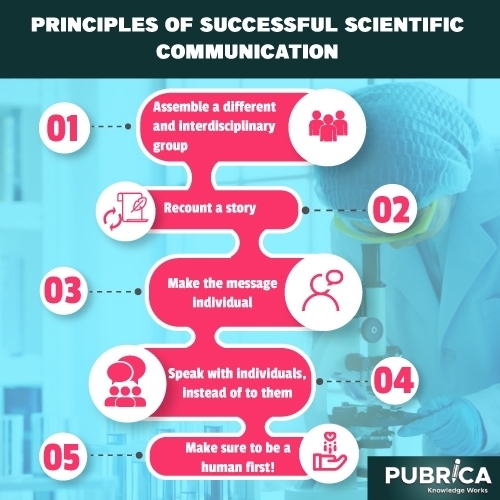
Critical checklists to support you on your scientific publication journey at each point
February 8, 2021
Essential Ingredients of a Scientific Research Proposal for Medical science
February 17, 2021In-brief:
- Science communication will produce support for scientific research or science studies and notify decision making
- It may be especially critical in addressing scientific misinformation, which spreads because it is not subject to the scientific method’s constraints.
- Pubrica lists out the basic principles for successful scientific communication and also provides Science Communication Services.
Introduction:
Science communication is the practice of updating, educating, hovering awareness of science-related topics, and increasing the intelligence about scientific discoveries and arguments. Science communicators and audiences are unclearly defined, and the expertise and level of science knowledge vary with each group and grab our medico marketing solution service.
Principles of successful scientific communication
Assemble a different and interdisciplinary group
- Scientists ought to perceive that while they might be specialists on a specific feature of an unforeseen issue, they may not be able to fill in as a specialist on all parts of the problem. Accordingly, researchers and communicators ought to work together to frame interdisciplinary logical groups to best address complex issues.
- Science resembles some other tremendous or administration — it should be deliberately conveyed on the off chance that we need individuals from people, in general, to acknowledge, use, or back it in their daily lives. In this way, research researchers need to join forces with content makers and professionals to share and “sell” logical outcomes viably.
- Collaboration frequently improves dynamic and critical thinking measures. Individuals have assorted psychological models that influence the route every one sees the world and how we comprehend or resolve issues. Satisfactory “figured world variety” can assist groups with making and impart science that is more inventive, delegate of a more extensive populace, and all the more comprehensively appropriate.

Recount a story
- Great science and extraordinary stories share something for all intents and purpose. Science communication ought to subsequently coordinate mixed realities into a far-reaching message, and recount the narrative of the examination interaction and results in a manner that connects with and applies to a group of people.
- There is a move towards eye-catching, tweet-sized science. Be mindful of dodging emotionalism and avoiding examining complex issues for tending to “tweet-sized issues”.
- In request to help our science recount a complete story that incorporates more voices and resounds with more assorted crowds. Researchers should be less numbers-driven and willing and anxious to fuse personal information and experiential information into their study using Medical marketing materials.
Make the message individual
- Understandable why individuals should often think about your science. It includes considering what is essential to the crowd and afterwards outlining your message, making it more confined from medical Indexing. For instance, talk about circumstances and logical results connections that affect individuals’ every day lives.
- The character and public view of the messenger matters. As communicators, we should consider what our names may mean for how our message is gotten.
- Be aware of the “data environment” or a socio-political scene where your science will be gotten. Science communicators need to think about their crowd individuals’ psychological models and consider how to best interface with crowds that might be socially extraordinary or impervious to the new data.
Speak with individuals, instead of to them
- It is commonly advantageous for researchers and people, in general, to set up a two-way exchange. Drawing in general society and tuning in to their information helps researchers make their examination more socially critical and extensive. In contrast, researchers’ exploration helps the public make educated, proof-based choices. Barring different voices from what ought to be a comprehensive discussion makes researchers lose public regard, compatibility, and backing using medical communication agency.
- Face-to-face cooperation and shared encounters are significant for creating connections and making learning results. Compelling science communicators should intend to make minutes that enthuse individuals to continue finding out about our science and posing inquiries, even after we are no more.
- Science communicators need to relinquish the data shortfall model. The shortfall model places that wariness or neglect of science originates from the public’s absence of information. On the off chance, researchers set aside an effort to instruct the majority and convey data, at that point, science-based dynamic, and public help of science will win all through society. This model doesn’t work! The missing connection isn’t communication, yet powerful post.
Make sure to be a human first!
- If we need individuals to comprehend and utilize our science in their lives, we should procure their trust. We ought to impart our science and convey our identity and where we come from to give our aptitude setting and gain confidence as people.
- Scientists are frequently worried about keeping up objectivity and taking out predisposition. While these objectives are reasonable in a lab setting concerning test plan and execution, they are not feasible, or even attractive, in a real environment regarding intricate, transdisciplinary, and dubious cultural issues. Researchers ought to understand that they are not target entertainers, and that science isn’t just one-sided, yet regularly naturally and unavoidably political. When conveying science, we should recognize our inclinations and keep up a legitimate and straightforward communication with our crowd.
- Scientists should work with different public to make socially-acknowledged and socially-helpful science. Above all else, science must convey to society. To fulfil this standard agreement, researchers need to team up with specialists in different trains and set up a characteristic two-route exchange with individuals from more extensive society to guarantee that science addresses the general population’s requirements.
Conclusion:
In today’s world, it’s not only chasing science but communicating it efficiently that’s vital. However, most of the time, we tend to limit our conversations to other scientists, academics, and corporates. Yet it’s bridging the break between the ‘science world’ and the overall, non-scientist public that’s critical. Pubrica gives you the basic principles for scientific communication in this blog and provides healthcare communication service.
References:
- Donev, D. (2013). Principles and ethics in scientific communication in biomedicine. Acta Informatica Medica, 21(4), 228.
- MacRae, D. (1971). Scientific communication, ethical argument, and public policy. The American Political Science Review, 65(1), 38-50.
